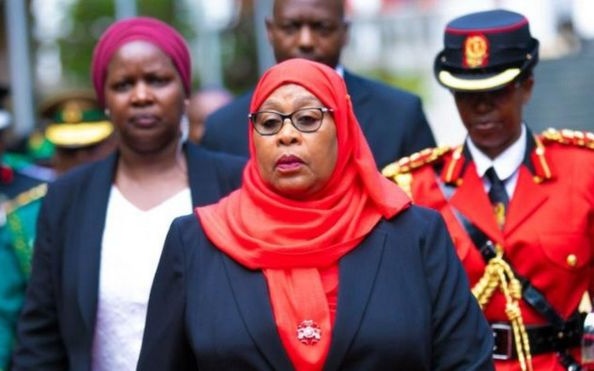This week Samia Suluhu Hassan (pictured) was appointed President of Tanzania after the sudden death of John Magufuli.
Hassan was Magufuli’s running mate in 2015, and they were re-elected last year. She will serve out the remainder of the five-year Presidential term.
Affectionately known as Mama Samia, the 61-year-old was first elected to public office in 2000. After various Governmental roles, she rose to national prominence in 2014, as the vice-chair of the Constituent Assembly, tasked with creating and drafting a new constitution.
Hassan is one of two African women who is a head of state, and her counterpart Sahle-Work Zewde of Ethiopia is in a ceremonial role. Hassan is one of two Muslim women in the top position, but Singapore’s Halimah binti Yacob is a ceremonial President.
I witnessed history through the coverage of Al Jazeera’s Catherine Soi and the tweets of Professor Nic Cheeseman, Professor of democracy of the University of Birmingham.
But why are few others outside Africa taking any notice?
A Notable Silence
You might think there would be international fanfare, front cover profiles, and a celebration of Mama Samia as East Africa’s first woman head of state running a Government. But there has been relative silence, compared to other success stories such as the rise of Jacinda Ardern, the New Zealand Prime Minister, or Kamala Harris becoming US Vice President.
When Ellen Johnson Sirleaf became the President of Liberia in 2006, most of the world’s liberal media championed her and her causes. Leaders like UK Prime Minister Tony Blair rushed to hang out with her.
Could it be Tanzania isn’t as important as Liberia? Is Mama Samia’s story not as ready-made for empathy as that of Ardern, Harris, or other women politicians in the “West”? Could it be that people assume Tanzanian democracy is not as important as US or UK democracy, despite the evidence of the past 12 months?
Or could it be as one of my friends said to me, “Hasan, it’s Africa, it’s a Muslim woman, and it isn’t a viral social media movement which is shared by [London Mayor] Sadiq Khan or [UK Baroness] Sayeeda Warsi — so others wouldn’t really care”?
Whatever the reason, it is likely that if Hassan was a leader based in the “West”, or if she was leading a country with a stronger connection to the west, or even if she was an Arab or a fair-skinned South Asian political leader, the silence would have been broken.
I scroll through my Facebook feed. Only two people have posted about Hassan’s ascent to office. Both are Black and from Africa. On my Twitter notifications, apart from the updates from news organisations, only two accounts have mentioned the story – both are white men who have an interest in African politics.
When epochal events take place, there are a rush of social media posts linking ourselves to the event, whether the cause is Black Lives Matter, MeToo or Reclaim the Streets. Mama Samia’s story may not be directly connected to these taglines for change, but as a Black, a Muslim, and a woman in another moment of history, is she unimportant?
There is much to do for advocates of progressive causes to de-clutter the mind and remove cognitive bias on race.
If we want to eradicate racism, then it is not enough to challenge the institutions and individuals whom we view as regressive. We also pay attention to our progressive communities. During last summer’s protests of Black Lives Matter, in the wake of George Floyd’s murder, I wrote, “While we learn of #BlackLivesMatter and structural racism, let’s also understand our silence to the subtle racisms within our communities, families, and homes.”
Mama Samia is a marker both of our silence and of how far we have to go.


Nice done.
Love your article.
You really do not need western approval to be a president, this is a country with Self -determination and that has value to observe.
“I do not need to ask my neighbours, if my Dad is truly my Dad”.
The only achievements listed here are her geographic location, sex, religion, and achieving high office. Good on her, but if this was supposed to provide a convincing reason why anyone outside of Tanzania should care about her, it failed completely. Overall zero insight and not one original thought went into writing this piece. Instead of asking the question given in the title, you should have asked yourself: “How newsworthy is this woman to the global audience?”
Because this article heavily implies that she isn’t at all, thus answering your original question, Mr. Hasan.
Mr. Patel stop the hypocrisy of accusing the silent observers(media) on Mama Samia Suluhu achievement as Africa’s female president while at the same time you don’t believe her when she said her predecessor Dr. John Magufuli died of HEART FAILURE, instead you chose to dwell on rumours of corona.
There could not have been celebration obviously on President Samia ascent to Presidency amidst mourning of 21 days over the death of her predecessor while on the Post
I was curious about the story till l saw that the late president had corona virus
Are you sure you read the story or you imagined your own story Mr Missbor Mrs Anonymous and commented on it. There is no mention of Irina Virus in the piece Hasan has posted.
Our president didn’t die from coronavirus, get your fact straight, it is shame for a journalist to fabricate stories. Shame for your editor as well.
Don’t be so naive, he was human, he contracted Covid-19 and died from it. Saying anything else is kidding yourself, just because he was the president didn’t make him invisible. Grow up and face the facts.
Well said.
Samia Hassan is a low profile leader with strong heart very determined in what she beleive in.